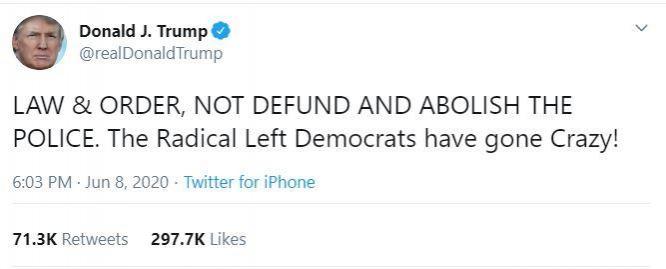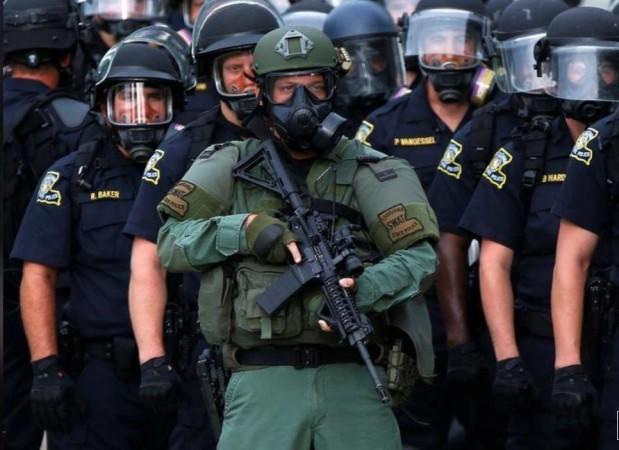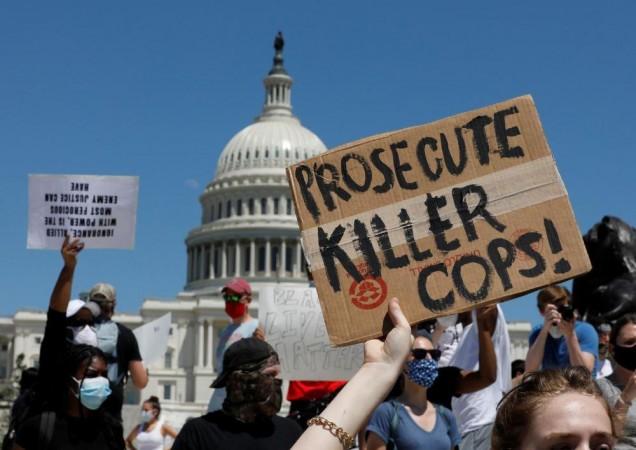Following the two weeks since George Floyd died under police custody after a police officer pressed his knee on his neck for eight minutes, and the ensuing protests, there has been a growing call to "defund the police" as a possible solution to end racial injustice and police brutality in the US.
While there are many who support the controversial measure, some lawmakers and political leaders including President Donald Trump and former Vice President Joe Biden have spoken against defunding the police.
White House press secretary Kayleigh McEnany told reporters that the "President is appalled by the defund the police movement."

Minneapolis vows to defund police
Going forward, however, proponents of the "defund the police" idea, like Minneapolis City Council earlier this week, vowed to "dismantle" the local police department in order to "recreates system that actually keeps us safe."
"It is clear that our system of policing is not keeping our communities safe," USA Today reported Council President Lisa Bender saying.
Mayors from Los Angeles and New York City also pledged to cut the funding from the police department's budget, and redistribute funds to youth initiatives and social services.

Is defunding same as disbanding?
But those against the measure of defunding the police see it with alarm. Detractors such as Fox News host Tucker Carlson said the idea sounds like a "nightmare" to him and that cutting police department budget would mean "thugs are in charge".
On the contrary, TV host John Oliver dedicated his entire Sunday night episode of "Last Week Tonight" on HBO to explain about the idea of "defund the police" and how some incidents of police brutality that make to news are just "the tip of a very large iceberg."
The different stands show that there is so much confusion over what "defund the police" actually means...
What does defund the police mean?
Simply talking, it means taking away a portion of funds, not all of it, allocated to the police department by the city's authority.
In this case, it can be seen in a larger context. The call for defunding the police isn't the end in itself here. It follows a bigger push by directing those funds from the police department to use for social programs.
"It's not just about taking away money from the police, it's about reinvesting those dollars into black communities. Communities that have been deeply divested from, communities that, some have never felt the impact of having true resources. And so we have to reconsider what we're resourcing. I've been saying we have an economy of punishment over an economy of care," USA Today reported Patrisse Cullors, a co-founder of the Black Lives Matter movement, telling to WBUR, Boston's public radio station.
Why defund the police?
The killing of George Floyd is not one of the cases of its type or an example of a few "bad actors" in the police force. In fact, there has been a long history of disproportionate police brutalities against people of colour.

According to an AP review of Minneapolis Police Department data, police used force for over 11,000 times in the past five years. And of those, 60% of it was used against Black people even though they represent only 19% of the city's population.
Alex S. Vitale, a professor of sociology at Brooklyn College, explains to NPR that there is a "myth" that police are politically neutral and enforce laws to benefit everyone equally.
Vitale goes on to say, "The reality is that America's social order has never been entirely equitable," and that the current police system though not used to manage slavery or colonialism today, "we are using police to manage the problems that our very unequal system has produced."
MPD150, a community advocacy organization in Minneapolis, that aims to bring "meaningful structural change" to police in the city, says that, "the people who respond to crises in our community should be the people who are best equipped to deal with those crises."

Rather than "strangers armed with guns", who patrols the area where they do not live, the organization says, first responders should be mental health providers, social workers, victim advocates and other community members in less visible roles.
Where these funds would go?
Most of those who vouch for defunding the police say the funds should go for social services to support people in marginalised communities.
Those dollars can be put back into social services for mental health, domestic violence and homelessness, among others. Police are often the first responders to all three, CNN reported Cullors telling it to WUBR.
Why not reform the police without cutting funds?
Detractors of the defund police movement have asked if police can be reformed without cutting its budget?
To this, Cullors of Black Lives Matter says that her organisation has worked with other groups on police reforms for years, yet black Americans are still being disproportionately killed or harmed by police.
"The body cameras have done nothing more than show us what's happened over and over again. The training has done nothing but show us that law enforcement and the culture of law enforcement is incapable of changing," Cullors said in the interview.
There have been concerns that lessening the funding might increase cases of violent crimes in the country.
"Cutting the LAPD budget means longer responses to 911 emergency calls, officers calling for backup won't get it, and rape, murder and assault investigations won't occur or will take forever to initiate, let alone complete," the Los Angeles Police Protective League's union's board said in a statement last week.
To this effect, MPD150 has some advice to share which it has posted on its website, "by shifting money away from the police and toward services that actually meet those needs, we'll be able to get to a place where people won't need to rob banks."
Defund the police does not mean disband the police.

















